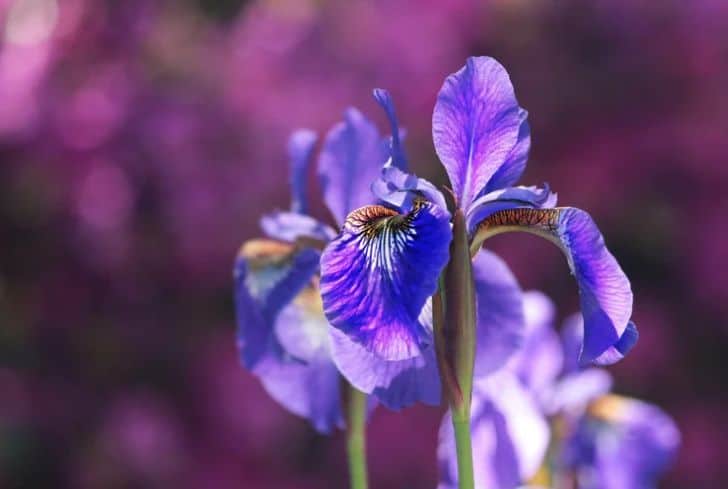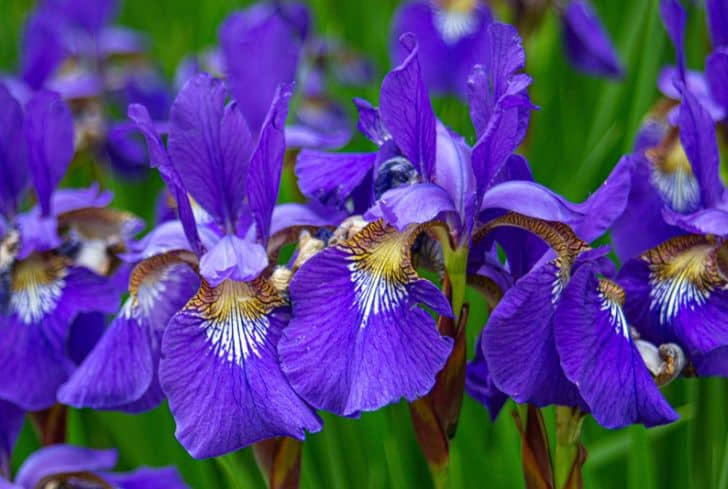Iris flowers come in a wide range of colors and shapes and can grow in almost any environment. While some varieties are more common than others, all gardeners want to protect their plants from pests and animals, which leaves us wondering, “do deer eat iris?”
Read: Do Deer Eat Hydrangeas?
Do Deer Eat Iris?
Nothing is more disappointing than deer or other animals feasting on your hard work in your garden space. While some places don’t have a high deer population, other areas may back up into a field or forest and have frequent four-legged visitors. If you live in a place that has one or more wandering deer, you’ll want to grow flowers that are deer resistant. Do deer eat iris?
Deer will not eat any variety of iris. Bearded iris, Siberian iris, African iris, and Japanese iris varieties are all deer resistant making them great to plant in borders of gardens or yards to deter deer from more enticing plants and vegetables.
While these plants are not a favorite for deer, deer may turn to iris to nibble during a dry season when there are minimal other food sources. However, they won’t eat much as they strongly dislike the strong fragrance and taste.
You can use other methods to deter deer from your garden space and protect flowers and plants. Whether you want to grow more deer-resistant flowers, create an environment that isn’t inviting, or use a deer-repellent spray, there are endless options for deer-proofing your yard.
Do Deer Eat Bearded Iris?
The most popular type of iris to grow is the bearded iris. These plants have a “beard” or lower petals that hang downward, giving a look similar to a beard. Since these flowers are some of the most common to grow, you may wonder if deer eat bearded iris.
Luckily, deer do not eat bearded iris plants. Since deer don’t like the strong smell or taste that the iris gives off, they tend to leave them alone. However, no plant is truly 100% deer resistant, as starving deer will eat almost anything during a dry season.
Bearded iris is coveted for their immense amount of color options. With options of red, orange, yellow, blue, purple, brown, white, pink, and many bicolors, there is a bearded iris for any garden. These plants are low maintenance and easy to grow, requiring full sun to produce bigger blooms each season.
While bearded iris is a fan favorite for homeowners and gardeners alike, it’s important to note that these plants are mildly toxic to cats and dogs. If you have a curious cat or flower-eating dog, skip and choose a pet-friendly alternative instead.
Do Deer Eat Siberian Iris?
The bearded iris may be the most popular iris variety, but they can be prone to rot and borer worms. When it comes to a hardier plant iris, many turn to the Siberian iris. These plants offer many advantages over the bearded iris but at the cost of the large ornamental blooms.
Siberian iris usually grows bluish violet flowers but can be cultivated in yellow, pink, white, or red. The flowers are smaller than those of the bearded iris. What the Siberian iris lacks in bloom size, they make up for with foliage. Once the blooms have faded, the Siberian iris still stuns with the look of ornamental grass.
These plants also can thrive in areas that may be too cold for other types of iris. The Siberian iris can survive even in USDA zone 3. With so many advantages over the bearded iris, we are left wondering if deer eat Siberian iris.
Deer don’t usually eat Siberian iris, especially if there are other food options around. Deer prefer flowers and foliage that don’t have a strong smell and have flat leaves, like hostas. Growing Siberian iris in borders or ditches helps protect other flowers from deer by repelling them.
Read: Do Deer Eat Hostas?
Do Deer Eat African Iris?
Another type of deer-resistant iris is the African iris. Unlike the Siberian iris, which can tolerate cold, the African iris cannot. Since this variety is native to South Africa, it isn’t cold hardy and can die from frost even in USDA zone 8.
African iris has unique coloring and is often referred to as “butterfly flag .”These flowers are perennials in USDA zones 8-10 and can handle periods of drought with grace. If you live in an area that is ideal for African iris plants, they make great border plants and can even be grown in planters. But do deer eat African iris?
African iris is deer resistant, like all varieties of iris. Deer are put off by the smell of iris plants and choose to eat other plants like hostas, daylilies, and roses. Deer will also eat shoots from trees and grass.
It can be disheartening to lose an entire garden to deer, but there are steps you can take to make your space less attractive. Sprinkling used coffee grounds throughout your space can deter deer, as well as using a packaged deer repellent solution available at your local garden center.

Do Deer Eat Japanese Iris?
It seems each type of iris has a place in the world’s ecosystem. Whether you live in a warm environment where African iris thrive or in the colder regions where you can enjoy Siberian iris, there is no shortage of iris varieties. Japanese iris plants thrive near water where other plants may have difficulty growing.
However, the Japanese iris is not always easy to grow. It requires just the right amount of sunlight, spacing, and soil composition. If you can get it right, the Japanese iris adds beauty to water features throughout USDA zones 4-9.
With so many other obstacles against you when growing the Japanese iris, you have to wonder if it is a common food for deer or other pests. Do deer eat Japanese iris?
Luckily, deer don’t eat Japanese iris, and the plant is considered to be deer resistant. While no plant is ever 100% safe from deer, iris plants as a species aren’t on the list of a deer’s favorite foods and will only become a snack if there are little to no other plants available.
Reasons Why Deer Don’t Like Eating Iris
There are over 280 species of iris throughout the world. Since all varieties of iris are deer resistant, it makes you wonder why deer don’t like eating iris.
Deer dislike iris varieties for different reasons. Some flowers have a strong aroma that puts deer off, while others have tough or sharp leaves. However, no iris is completely safe from deer, as a hungry deer will eat just about anything that comes into its path.
Many people like to use iris and other deer-resistant plants in borders or along the outside edges of their yards and gardens to help keep deer from spotting plants they like within. This method is a natural way to deter deer.
Sadly, more than a few gardeners have come out to their gardens and discovered that deer had eaten their iris down to the ground. If you are concerned about your iris garden or other plants, there are steps you can take to make your space look uninviting to deer and other animals.
How to Keep Deer Away From Irises?
Since no plants are ever 100% safe from deer, you may be wondering what steps you can take to help prevent deer from entering your property and eating your garden. While fencing your space is a great start, there are many other things you can do to keep deer away from irises.
When it comes to deterring deer from your irises or other plants, there are a variety of methods you can use. Sprinkling used coffee grounds around your property has been thought to be successful at keeping deer away from your garden.
Using store-bought deer-repellent sprays and planting deer-repelling plants also can help keep your space deer free. The most important thing to keep in mind when trying to deter deer is to make your space seem uninviting to them.
What Animal Eats Iris Flowers?
Since iris plants are considered deer resistant, what animal eats iris flowers?
While the occasional deer, rabbit, or mole may nibble on your iris plants from time to time, the major problem pests include aphids and borer caterpillars. Deers, rabbits, and moles tend to avoid iris due to their strong scents. However, aphids and borer caterpillars can cause severe damage to your iris if infested.
Keeping an eye out for these insect pests is important as once the plant has become infested, it can be hard to treat and save the iris from death. These pests can also spread to other plants nearby.
Read: Do Deer Eat Peonies?
Prevention is the best method when dealing with borer caterpillars and aphids. Spray your irises with a pesticide, insecticidal soap, or neem oil throughout the season. You can also try to wash off aphids with a strong spray from the hose. But be sure to do this early in the morning to allow the leaves to dry throughout the day. Wet leaves can lead to fungal infections.






